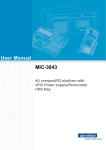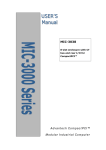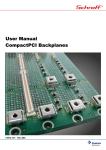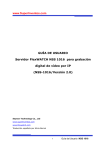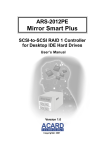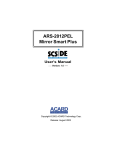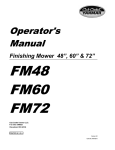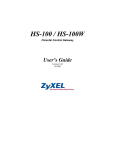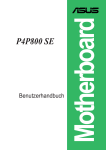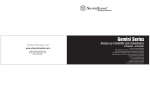Download Advantech MIC-3043 User's Manual
Transcript
MIC-3043 MIC-3043A MIC-3043A-B MIC-3043B MIC-3043B-B MIC-3043C MIC-3043C-B MIC-3043D MIC-3043D-B 4U compactPCI platform with cPCI Power supply/Removable HDD Bay User Manual Copyright The documentation and the software included with this product are copyrighted 2006 by Advantech Co., Ltd. All rights are reserved. Advantech Co., Ltd. reserves the right to make improvements in the products described in this manual at any time without notice. No part of this manual may be reproduced, copied, translated or transmitted in any form or by any means without the prior written permission of Advantech Co., Ltd. Information provided in this manual is intended to be accurate and reliable. However, Advantech Co., Ltd. assumes no responsibility for its use, nor for any infringements of the rights of third parties, which may result from its use. Acknowledgements PICMG™, CompactPCI® and the PICMG™, CompactPCI® logos are trademarks of the PCI Industrial Computers Intel® and Pentium® are trademarks of Intel Corporation. Microsoft® Windows® and MS-DOS® are registered trademarks of Microsoft Corp. All other product names or trademarks are properties of their respective owners. Part No. 2002304300 2nd Edition Printed in Taiwan October 2006 MIC-3043 User Manual ii Product Warranty (1 year) Advantech warrants to you, the original purchaser, that each of its products will be free from defects in materials and workmanship for one year from the date of purchase. This warranty does not apply to any products which have been repaired or altered by persons other than repair personnel authorized by Advantech, or which have been subject to misuse, abuse, accident or improper installation. Advantech assumes no liability under the terms of this warranty as a consequence of such events. Because of Advantech’s high quality-control standards and rigorous testing, most of our customers never need to use our repair service. If an Advantech product is defective, it will be repaired or replaced at no charge during the warranty period. For out-of-warranty repairs, you will be billed according to the cost of replacement materials, service time and freight. Please consult your dealer for more details. If you think you have a defective product, follow these steps: 1. Collect all the information about the problem encountered. (For example, CPU speed, Advantech products used, other hardware and software used, etc.) Note anything abnormal and list any onscreen messages you get when the problem occurs. 2. Call your dealer and describe the problem. Please have your manual, product, and any helpful information readily available. 3. If your product is diagnosed as defective, obtain an RMA (return merchandise authorization) number from your dealer. This allows us to process your return more quickly. 4. Carefully pack the defective product, a fully-completed Repair and Replacement Order Card and a photocopy proof of purchase date (such as your sales receipt) in a shippable container. A product returned without proof of the purchase date is not eligible for warranty service. 5. Write the RMA number visibly on the outside of the package and ship it prepaid to your dealer. iii Declaration of Conformity CE This product has passed the CE test for environmental specifications when shielded cables are used for external wiring. We recommend the use of shielded cables. This kind of cable is available from Advantech. Please contact your local supplier for ordering information. FCC Class A Note: This equipment has been tested and found to comply with the limits for a Class A digital device, pursuant to part 15 of the FCC Rules. These limits are designed to provide reasonable protection against harmful interference when the equipment is operated in a commercial environment. This equipment generates, uses, and can radiate radio frequency energy and, if not installed and used in accordance with the instruction manual, may cause harmful interference to radio communications. Operation of this equipment in a residential area is likely to cause harmful interference in which case the user will be required to correct the interference at his own expense. CCC Class A The statement for this A level product, in the living conditions, this product may cause harmful interference to radio communications. In this kind of situation, the user may need to take measures to rectify the disturbance. MIC-3043 User Manual iv Technical Support and Assistance Step 1. If you have any technical questions about the MIC-3043 or any other Advantech products, please visit our support website at: www.advantech.com.tw/support Step 2. Contact your distributor, sales representative, or Advantech's customer service center for technical support if you need additional assistance. Please have the following information ready before you call: - Product name and serial number - Description of your peripheral attachments - Description of your software (operating system, version, application software, etc.) - A complete description of the problem - The exact wording of any error messages Document Feedback To assist us in making improvements to this manual, we would welcome comments and constructive criticism. Please send all such - in writing to: [email protected] For more information about Advantech's products and sales information, please visit: http://www.advantech.com Packing List Before setting up the system, check that the items listed below are included and in good condition. If any item does not accord with the table, please contact your dealer immediately. • One MIC-3043 CompactPCI enclosure with backplane • One box of accessories • One warranty certificate • One CD-ROM disk for user manual (PDF file) v Safety Instructions 1. Read these safety instructions carefully. 2. Keep this User's Manual for later reference. 3. Disconnect this equipment from any AC outlet before cleaning. Use a damp cloth. Do not use liquid or spray detergents for cleaning. 4. For plug-in equipment, the power outlet socket must be located near the equipment and must be easily accessible. 5. Keep this equipment away from humidity. 6. Put this equipment on a reliable surface during installation. Dropping it or letting it fall may cause damage. 7. The openings on the enclosure are for air convection. Protect the equipment from overheating. DO NOT COVER THE OPENINGS. 8. Make sure the voltage of the power source is correct before connecting the equipment to the power outlet. 9. Position the power cord so that people cannot step on it. Do not place anything over the power cord. 10. All cautions and warnings on the equipment should be noted. 11. If the equipment is not used for a long time, disconnect it from the power source to avoid damage by transient overvoltage. 12. Never pour any liquid into an opening. This may cause fire or electrical shock. 13. Never open the equipment. For safety reasons, the equipment should be opened only by qualified service personnel. 14. If one of the following situations arises, get the equipment checked by service personnel: a. The power cord or plug is damaged. b. Liquid has penetrated into the equipment. c. The equipment has been exposed to moisture. d. The equipment does not work well, or you cannot get it to work according to the user's manual. e. The equipment has been dropped and damaged. f. The equipment has obvious signs of breakage. 15. DO NOT LEAVE THIS EQUIPMENT IN AN ENVIRONMENT WHERE THE STORAGE TEMPERATURE MAY GO BELOW 20° C (-4° F) OR ABOVE 60° C (140° F). THIS COULD DAMAGE THE EQUIPMENT. THE EQUIPMENT SHOULD BE IN A CONTROLLED ENVIRONMENT. MIC-3043 User Manual vi 16. CAUTION: DANGER OF EXPLOSION IF BATTERY IS INCORRECTLY REPLACED. REPLACE ONLY WITH THE SAME OR EQUIVALENT TYPE RECOMMENDED BY THE MANUFACTURER, DISCARD USED BATTERIES ACCORDING TO THE MANUFACTURER'S INSTRUCTIONS. The sound pressure level at the operator's position according to IEC 7041:1982 is no more than 70 dB (A). DISCLAIMER: This set of instructions is given according to IEC 704-1. Advantech disclaims all responsibility for the accuracy of any statements contained herein. Wichtige Sicherheishinweise 1. Bitte lesen sie Sich diese Hinweise sorgfältig durch. 2. Heben Sie diese Anleitung für den späteren Gebrauch auf. 3. Vor jedem Reinigen ist das Gerät vom Stromnetz zu trennen. Verwenden Sie Keine Flüssig-oder Aerosolreiniger. Am besten dient ein angefeuchtetes Tuch zur Reinigung. 4. Die NetzanschluBsteckdose soll nahe dem Gerät angebracht und leicht zugänglich sein. 5. Das Gerät ist vor Feuchtigkeit zu schützen. 6. Bei der Aufstellung des Gerätes ist auf sicheren Stand zu achten. Ein Kippen oder Fallen könnte Verletzungen hervorrufen. 7. Die Belüftungsöffnungen dienen zur Luftzirkulation die das Gerät vor überhitzung schützt. Sorgen Sie dafür, daB diese Öffnungen nicht abgedeckt werden. 8. Beachten Sie beim. AnschluB an das Stromnetz die AnschluBwerte. 9. Verlegen Sie die NetzanschluBleitung so, daB niemand darüber fallen kann. Es sollte auch nichts auf der Leitung abgestellt werden. 10. Alle Hinweise und Warnungen die sich am Geräten befinden sind zu beachten. 11. Wird das Gerät über einen längeren Zeitraum nicht benutzt, sollten Sie es vom Stromnetz trennen. Somit wird im Falle einer Überspannung eine Beschädigung vermieden. 12. Durch die Lüftungsöffnungen dürfen niemals Gegenstände oder Flüssigkeiten in das Gerät gelangen. Dies könnte einen Brand bzw. elektrischen Schlag auslösen. 13. Öffnen Sie niemals das Gerät. Das Gerät darf aus Gründen der elektrischen Sicherheit nur von authorisiertem Servicepersonal geöffnet werden. 14. Wenn folgende Situationen auftreten ist das Gerät vom Stromnetz vii zu trennen und von einer qualifizierten Servicestelle zu überprüfen: a - Netzkabel oder Netzstecker sind beschädigt. b - Flüssigkeit ist in das Gerät eingedrungen. c - Das Gerät war Feuchtigkeit ausgesetzt. d - Wenn das Gerät nicht der Bedienungsanleitung entsprechend funktioniert oder Sie mit Hilfe dieser Anleitung keine Verbesserung erzielen. e - Das Gerät ist gefallen und/oder das Gehäuse ist beschädigt. f - Wenn das Gerät deutliche Anzeichen eines Defektes aufweist. 15. VOSICHT: Explisionsgefahr bei unsachgemaben Austausch der Batterie.Ersatz nur durch densellben order einem vom Hersteller empfohlene-mahnlichen Typ. Entsorgung gebrauchter Batterien navh Angaben des Herstellers. 16. ACHTUNG: Es besteht die Explosionsgefahr, falls die Batterie auf nicht fach-männische Weise gewechselt wird. Verfangen Sie die Batterie nur gleicher oder entsprechender Type, wie vom Hersteller empfohlen. Entsorgen Sie Batterien nach Anweisung des Herstellers. Der arbeitsplatzbezogene Schalldruckpegel nach DIN 45 635 Teil 1000 beträgt 70dB(A) oder weiger. Haftungsausschluss: Die Bedienungsanleitungen wurden entsprechend der IEC-704-1 erstellt. Advantech lehnt jegliche Verantwortung für die Richtigkeit der in diesem Zusammenhang getätigten Aussagen ab. Safety Precaution - Static Electricity Follow these simple precautions to protect yourself from harm and the products from damage. 1. To avoid electrical shock, always disconnect the power from your PC chassis before you work on it. Don't touch any components on the CPU card or other cards while the PC is on. 2. Disconnect power before making any configuration changes. The sudden rush of power as you connect a jumper or install a card may damage sensitive electronic components. MIC-3043 User Manual viii Contents Chapter Chapter 1 Hardware Configuration ................................ 2 1.1 1.2 1.3 Introduction ....................................................................... 2 Features ............................................................................. 3 Specifications .................................................................... 3 1.4 Dimensions and Appearance............................................. 5 1.3.1 1.3.2 1.3.3 2 Installation ....................................................... 8 2.1 2.2 2.3 Initial Inspection................................................................ 8 The MIC-3043 Illustration ................................................ 8 Installation Procedures ...................................................... 9 2.3.1 2.3.2 2.3.3 2.3.4 2.3.5 2.3.6 2.3.7 2.3.8 Chapter General ........................................................................... 3 Hot-swap Fans ............................................................... 4 Power Supply ................................................................. 4 Card Installation and Removal ...................................... 9 Before Operating the System ....................................... 11 Installing a 3.5" Hard Disk Drive ................................ 11 Connecting the rear I/O module ................................... 12 Configuring the built-in RAID (SCSI) by RIO module (MIC-3043C series only) ................................................. 12 Configuring the built-in IDE for the RIO module (MIC-3043A and IC-3043B series) .................................. 13 Table 2.1: HDD number for type A.............................. 13 Table 2.2:HDD number for type B ............................... 13 Figure 2.5:IDE adaptor (type B .................................... 14 Configuring the built-in SATA for the RIO module (MIC-3043D series) .................................................... 14 Figure 2.6:The location of jumper switch..................... 14 Figure 2.7: Setting table for IDE/SATA selection........ 14 Replacing the Hot-swap Fan ........................................ 15 Figure 2.8: Hot-swappable fan maintenance15 3 Backplane....................................................... 18 3.1 3.2 3.3 3.4 General Information ........................................................ 18 Features ........................................................................... 18 Specification.................................................................... 18 Slot Assignments............................................................. 19 3.5 Connector and Jumper Locations.................................... 21 Table 3.1: System to peripheral slot signal assignment ...... 20 Figure 3.1: MIC-3811 and MIC-3812 slot numbering........ 21 3.5.1 3.5.2 Table 3.2: Backplane connector and jumper description .... 21 AC/DC Power Connector (CN3, CN17) ...................... 23 Power Switch ............................................................... 23 ix Table of Contents 3.5.3 3.5.4 3.5.5 3.6 V I/O Voltage Selection .............................................. 23 Figure 3.5:V I/O voltage selection................................ 23 Fan Module Connector ................................................ 24 Alert indicators ............................................................ 24 Clock Routing Configuration .......................................... 24 Appendix A Pin Assignments ............................................ 26 A.1 A.2 A.3 A.4 A.5 A.6 A.7 A.8 A.9 A.10 A.11 A.12 A.13 A.14 A.15 A.16 A.17 A.18 A.19 A.20 MIC-3812 and MIC-3811 System Slot P1 Connector .... 26 MIC-3812 and MIC-3811 System Slot P2 Connector .... 27 MIC-3812 and MIC-3811 System Slots P3 Connector... 28 MIC-3812 and MIC-3811 System Slots P4 Connector... 29 MIC-3812 and MIC-3811 System Slots P5 Connector... 30 MIC-3812 and MIC-3811 Peripheral Slot P1 Connector 31 MIC-3812 and MIC-3811 Peripheral Slot P2 Connector 32 MIC-3812 and MIC-3811 Peripheral Slot P3 Connector 33 MIC-3812 Peripheral Slot P4 Connector ........................ 34 MIC-3811 Peripheral Slot P4 Connector ........................ 35 MIC-3811 Peripheral Slot P5 Connector ........................ 36 MIC-3812 Peripheral Slot P5 Connector ........................ 37 Fan Module Connectors .................................................. 38 LED Board Connector..................................................... 38 MIC-3812 & MIC-3812 Alarm Board Interface Connector..... 39 cPCI Power Connector (CN1,CN2, and CN5)................ 40 AC/DC Power Connector (CN3)..................................... 41 AC/DC Power Connector (CN17)................................... 42 Enable Power Switch Connector (CN15)........................ 42 Device Power Connector (CN18) ................................... 43 Appendix B Ordering Information ................................... 46 Table B.1: Recommended 6U CompactPCI SBC ....... 47 MIC-3043 User Manual x CHAPTER 2 1 Hardware Configuration Chapter 1 Hardware Configuration 1.1 Introduction The MIC-3043 is a 4U-high enclosure designed as a high availability platform that supplies six CompactPCI slots for rack mounting. At the same height as a typical 4U platform, the MIC-3043 offers the equivalent capacity of 6U slot support in CompactPCI format. Thus, the maximum space efficiency required for applications like CT and networking is easily achieved. There are two compatible backplane solutions for the MIC-3043: one with H.110 CT bus support, and one without. MIC-3043 is also equipped with a 2+1 (500W+250W) hot-swappable/ redundant AC or DC compactPCI power supply that can fulfill most application requirements in a 4U-high system. With 1U space reserved for a storage device (SCSI or IDE) on top of the chassis, it gives maximum flexibility for most applications. The MIC-3043 has one slim-line CD-ROM drive built-in to maximize the available space in this 4U-high chassis. With a flexible modular design, the chassis accommodates a hot-swappable cooling fan, easily-maintainable power supply, and system status monitoring and control. For those mission-critical applications with high-manageability demands, MIC-3043 is compatible with a Chassis Management Module, the MIC-3924L-A, which is a stand-alone system environment monitoring module. There are eight MIC-3043 series: • MIC-3043A: 4U-high CompactPCI enclosure with 6-slot backplane (MIC-3811) that supports H.110 CT bus, removable IDE device bay, hot-swappable cooling fan modules. Power supply not included. • MIC-3043A-B: identical to MIC-3043A chassis including 1+1 (250W+250W) redundant AC cPCI power supply. • MIC-3043B: A 4U-high CompactPCI enclosure with 6-slot backplane (MIC-3812) that doesn't support H.110 CT bus, removable IDE device bay, hot-swappable cooling fan modules. Power supply not included. • MIC-3043B-B: identical to MIC-3043B chassis including 1+1 (250W+250W) redundant AC cPCI power supply. • MIC-3043C: A 4U-high CompactPCI enclosure with 6-slot backplane with CT bus support, hot-swappable SCSI device bay, hot-swappable cooling fan modules. Power supply not included. • MIC-3043C-B: identical to MIC-3043C chassis including 1+1 (250W+250W) redundant AC cPCI power supply. MIC-3043 User Manual 2 • MIC-3043D: A 4U-high CompactPCI enclosure with 6-slot backplane with CT bus support, removable/ hot-swappable SATA device bay, hot-swappable cooling fan modules. Power supply not included. • MIC-3043D-B: identical to MIC-3043D chassis including 1+1 (250W+250W) redundant AC cPCI power supply. Note: (1) For RoHS version, the ordering number will plus an "E" in the last such as MIC-3043DE. (2) Please contact local distributor to order DC and 2+1 (500W+250W) power supplies. 1.2 Features • Six 6U card slots • Supports front and rear I/O • Supports H.110 CT application or non-CT application • SCSI or IDE storage devices support • 2+1 (500W+250W) hot swappable/redundant AC or DC CompactPCI power supplies • Hot-swap fan modules • Integrated intelligent fault detection and alarm module, MIC-3924L-A. 1.3 Specifications 1.3.1 General • Construction: Aluminum frame and galvanized sheet steel • I/O interfaces: 6-slot space (24 TE), including one system slot and five peripheral slots • "Hot-swappable" platform complies with PICMG 2.1 R 1.0 Hot Swap Specification 3 Chapter 1 Dimensions and Weight • WxHxD: mounting flanges not included: • 4U: 440x177x320 mm (17.3x7x12.6") • Weight: 18 kg (39.7 lb) with 2+1 (500W+250W) redundant PSU Mechanical and Environmental Specifications • Operating temperature: 0 ~ 45° C • Storage temperature: -20° C ~ 60° C • Relative humidity: 10 ~ 95% @ 40° C, non-condensing • Operating altitude: 0 ~ 3,048 meters (0 ~ 10,000 feet) • Storage/transit altitude: 0 ~ 12,190 meters (40,000 feet) • Shock: 10 G (operating); 30 G (storage/transit) • Random vibration: 1.0 Grms (operating) without HDD 1.3.2 Hot-swap Fans • Air flow: 193 CFM (front side Fan/hot swappable); 61.3 CFM (Rear Side Fan) • Power consumption: 1.42 A @12 V (TYP); 0.3 A @12 V (TYP) • Rated fan speed: 3000 RPM; 3400 RPM • Life expectancy: 50,000 hours @ 25° C 1.3.3 Power Supply • Input: 1. AC: 100~240 V @ 47~63 Hz, full range (for MIC-3043X-A models) 2. DC: -48 V (TYP), -36~-72 V range (Optional) • Output: 2+1 (500W+250W) hot swappable and redundant AC or DC w/PFC • Maximum load: +3.3 V @ 36 A, +5 V @ 50 A, +12 V @ 10 A, -12 V @ 1 A • Minimum load: +3.3 V @ 0 A, + 5 V @ 2 A, +12 V @ 0 A, -12 V @ 0 A • MTBF: AC: 266,241 hours @ 25° C; DC: 92,859 hours @ 30° C • Safety: UL/CE/TUV /CCC MIC-3043 User Manual 4 1.4 Dimensions and Appearance Figure 1.1: MIC-3043 functional block diagram Figure 1.2: Appearance of MIC-3043 5 Chapter 1 CHAPTER 2 Installation 2 Chapter 2 Installation 2.1 Initial Inspection We have carefully inspected the MIC-3043 mechanically and electrically before shipping. It should be free of marks and scratches and in perfect working order upon receipt. As you unpack the MIC-3043, check it for signs of shipping damage (damaged box, scratches, dents, etc.). If it is damaged or fails to meet specifications, notify our service department or your local representative immediately. Also notify the carrier. Retain the shipping carton and packing material for inspection by the carrier. After inspection, we will make arrangements to repair or replace the unit. Warning! We strongly recommend that only qualified, experienced personnel install or remove components. They must exercise extreme caution when doing so. 2.2 The MIC-3043 Illustration The MIC-3043 is designed for easy installation and maintenance. Figure 2-1 and Figure 2-2 illustrate important components on the front and hotswappable parts of the enclosure. Figure 2.1: Front view of MIC-3043 MIC-3043 User Manual 8 Figure 2.2: Front view of MIC-3043 2.3 Installation Procedures 2.3.1 Card Installation and Removal The CompactPCI connectors are firm and rigid, and require careful handling. Improper installation of a card can easily damage the backplane of the chassis. The system card can be installed only in the system slot. The CompactPCI specification allows the system slot to be in any position on the backplane. Do not insert the system card into any other slot, and do not insert a peripheral card into the system slot. The MIC-3043 accepts different backplanes, so the location of the system slot may vary. The system slot is marked by a triangle enclosing the slot number. Please refer to the backplane user's manual. The insert/eject handles on CompactPCI cards help users to install and remove the cards easily and safely. Follow the procedures below to install a card into a chassis: To install a card: 1. Hold the card vertically. Be sure that the card is oriented correctly. The components of the card should be pointing to the right-hand side. 9 Chapter 2 2. Make sure that the handles of the card are not latched. Release the handles if they are latched. Handles from different vendors may have different latch designs. Caution!!! Keep your fingers away from the latch hinges to prevent your fingers from getting pinched. 3. Insert the card into the chassis by sliding the upper and lower edges of the card into the card guides. 4. Push the card into the slot gently by sliding the card along the card guide until the handles meet the rectangular holes of the cross rails. Figure 2.3: Installing a card into the chassis Note: If the card is correctly positioned and has been slid all the way into the chassis, the handles should match the rectangular holes. If not, remove the card from the card guide and repeat step 3 again. Do not try to install a card by forcing it into the chassis. 5. Pull the upper handle down and lift the lower handle up to push the card into place. 6. Secure the card by locking the handles into place. MIC-3043 User Manual 10 To remove a card: 1. Unscrew the screws on the card front panel. Release the locking latches on the handles. 2. Lift the upper handle up and press the lower handle down to release the card from the backplane. 3. Slide the card out. 2.3.2 Before Operating the System Before operating your system, first check your power supply source. Adjust the switch on the power supply to the correct voltage. Two mounting flanges are included for users who would like to install the MIC-3043 on a 19" rack. 2.3.3 Installing a 3.5" Hard Disk Drive Follow these procedures to install 3.5" hard disk drives in the MIC-3043: 1. Open the disk tray door and remove the mobile rack. For a SCSI version, the SCSI ID is shown on the mobile rack panel. This is the same ID that the SCSI control would find after system startup. 2. Mount the HDD (SCSI/IDE/SATA) on the mobile rack with screws. 3. Slide the HDD with mobile rack back into the tray. 4. Power on the system and check that the HDD can be found at the SCSI initialization. Note: (1) The SCSI version (MIC-3043C) must be used with a RIO module that has a SCSI controller, like RIO-3309S-A. (2) The SCSI ID is assigned by the internal SCSI adaptor of MIC-3043, #0 and #1 are fixed and cannot be changed. Users can read the number on the disk mobile rack.. 11 Chapter 2 2.3.4 Connecting the rear I/O module The MIC-3043 must be used with a proper rear I/O module. For enclosures with a SCSI drive bay, the rear I/O module must also support the internal SCSI function (e.g. RIO-3309S-A1). Please refer to the recommended configuration list for details. To install the RIO module, please follow the steps below: 1. Remove the blank panel above the system RIO slot. (We suggest removing all the blank panels before inserting the RIO module. 2. Users will find two cables inside, one IDE (40-pin) cable and one SCSI cable (68-pin) 3. Connect each cable to its connector on the I/O board, and then slide the RIO module into the card cage. 4. Power up the system and check that all the storage devices work properly. 2.3.5 Configuring the built-in RAID (SCSI) by RIO module (MIC-3043C series only) The MIC-3043C supports two SCSI HDD bays. The SCSI HDDs must be used in conjunction with a RIO module that has SCSI RAID-1 built-in. For details about configuring the RAID feature, please refer to the RIO module user manual. Note: (1) Not all RIO modules support SCSI feature with RAID function. (2) RIO-3309S modules support built-in Adaptec AIC-7901 (Ultra 320 SCSI controller chip) with RAID function. Figure 2.4: SCSI adaptor MIC-3043 User Manual 12 2.3.6 Configuring the built-in IDE for the RIO module (MIC-3043A and IC-3043B series) The MIC-3043A and MIC-3043B have IDE versions that support a removable HDD (not hot-swappable). Since there are many different HDD connectors on the market, please refer to the combination list "HDD number for type A" or "HDD number for type B" and Note 3 (below) before purchasing the IDE HDD. An illustration of the type B adaptor is shown in Figure 2-5 on the next page. Note: (1) The IDE CD-ROM has to use the "USB to IDE" interface. (2) There are two types of IDE adapters. The default IDE adapter is type A. Users may also find a type B adaptor included in the accessory box. (3) AVL of HDD drive for two IDE adapter types. Table 2.1: HDD number for type A Seagate IBM Maxtor HITACHI ST340016A ST32122A ST313620A ST320413A DJNA-371350 DiamondMax Plus 8 IC35L120AVV2 07-0 Table 2.2: HDD number for type B Maxtor 4G120J6 13 Chapter 2 Figure 2.5:IDE adaptor (type B 2.3.7 Configuring the built-in SATA for the RIO module (MIC-3043D series) MIC-3043D has SATA versions that support a removable or hot-swappable HDD which depends on RIO module type. Hot-swappable mode must use RIO module supporting SATA interface; conversely, IDE interface is only for removable. The default setting is through IDE interface. There is a DIP switch on HDD backplane for IDE/SATA selection. An illustration of the switch location is shown in Figure 2-6 as below. Figure 2.6: The location of jumper switch Figure 2.7: Setting table for IDE/SATA selection MIC-3043 User Manual 14 2.3.8 Replacing the Hot-swap Fan The MIC-3043 provides one hot-swap fan. Please refer to Figure 2-1 and 2-2. The fan can be removed without turning off the system power or interrupting the system operation. Follow these steps to replace a fan: 1. Unfasten the fan holder. 2. Slide the fan holder out. 3. Replace the old fan with a new one. 4. Slide the fan holder in. 5. Fasten the new fan holder. Figure 2.8: Hot-swappable fan maintenance 15 Chapter 2 CHAPTER 2 Backplane 3 Chapter 3 Backplane 3.1 General Information There are two backplanes models that are compatible with the MIC-3043 series. MIC-3043A, MIC-3043C and MIC-3043D support the H.110 CT bus backplane, the MIC-3811. The MIC-3043B supports a non-CT backplane MIC-3812. Both backplanes provide six CompactPCI slots with one slot dedicated to the CPU board. The MIC-3043 supports front I/O wiring, providing simplified system cabling. The backplane also provides several 3-pin connectors to connect a hot-swappable cooling fan module. The MIC-3043 complies with PICMG 2.1 Hot-Swap Specification, providing full hot-swapping capability. Users can build a hot-swap system using hot-swap plug-in boards and software. 3.2 Features • Six CompactPCI slots (one system slot and five peripheral slots) • 64-bit PCI bus compliant • Complies with PICMG 2.1 Hot-Swap Specification • Accepts 2+1 (500W+250W) hot-swappable/redundant AC or DC CompactPCI power supplies • Chassis alarm module for environment monitoring. • Hot-swappable fan interface • Supports dual SCSI or IDE HDD bays 3.3 Specification • Six CompactPCI slots (one system slot and five peripheral slots) • PCI Bus width: 64-bit • Power connector: Two AC/DC power connectors for separate power input support • Complies with CompactPCI Specification PICMG 2.0, R.3.0 • Complies with CompactPCI Hot-Swap Specification PICMG 2.1, R2.0. MIC-3043 User Manual 18 • Complies with CompactPCI Front-Access Power Connectors PICMG 2.11, R3.0. • Complies with CompactPCI Computer Telephony PICMG2.5, R1.0 (optional) • Dimensions: 440 x 177 x 320 mm (17.3" x 7" x 12.6") • Operating temperature: 0° C ~ 45° C 3.4 Slot Assignments The CompactPCI specification defines slot numbering separation for physical and logical slots. Each slot has a physical number and a logical number (refer to the CompactPCI specification version 2.0 R3.0 for further information on slot assignments). The physical numbers are printed on the backplane, enclosed in circles or triangles. Slot5 of MIC-3811 and MIC-3812, marked by a triangle, is the system slot and can only be used by a CPU board. The other slots are peripheral slots. The logical number of each slot is defined according to the IDSEL signal and the associated address used to select the slot. Table 3-1 shows the system slot and peripheral slot relationships on the backplane. The system slot has a logical number of 5, and peripheral slots have logical numbers of 1~4, and 6. The connectors in logical slot 1 are designated as 1-P1, 1-P2, and 1-P3 from the bottom up. Nomenclature for connectors in the other slot is similar, such as 2-P1 and 2-P2. Connector S5P1 on the system slot (slot 5) is a keyed connector providing a 32-bit CompactPCI bus between the system slot and the peripheral slot. Connector S5P2 on the system slot (slot 5) is an un-keyed connector providing 64-bit CompactPCI bus between the system slot and the peripheral slots. Connector S5P3 on the system slot (slot 5) is open for user definition. The pin assignment of connector S5P4 and S5P5 is only for H.110 CT bus support with MIC-3043A and MIC-3043C. For MIC-3043B, they are open for user definition. Please check appendix A for the pin assignment of all connectors on the backplane. 19 Chapter 3 Table 3.1: System to peripheral slot signal assignment System Slot (Logical Slot 5) Peripheral Slot (Logical Slot 6) CLK4 P1:D6 CLK P1:D6 AD31 P1:E6 IDSEL P1:B9 REQ0# P1:A6 REQ# P1:A6 GNT0# P1:E5 GNT# P1:E5 System Slot (Logical Slot 5) Peripheral Slot (Logical Slot 4) CLK1 P2:A1 CLK P1:D6 AD30 P1:A7 IDSEL P1:B9 REQ1# P2:C1 REQ# P1:A6 GNT1# P2:D1 GNT# P1:E5 System Slot (Logical Slot 5) Peripheral Slot (Logical Slot 3) CLK2 P2:A2 CLK P1:D6 AD29 P1:B7 IDSEL P1:B9 REQ2# P2:E2 REQ# P1:A6 GNT2# P2:D2 GNT# P1:E5 System Slot (Logical Slot 5) Peripheral Slot (Logical Slot 2) CLK3 P2:B2 CLK P1:D6 AD28 P1:C7 IDSEL P1:B9 REQ3# P2:E2 REQ# P1:A6 GNT3# P2:C3 GNT# P1:E5 System Slot (Logical Slot 5) Peripheral Slot (Logical Slot 1) CLK0 P2:A3 CLK P1:D6 AD27 P1:E7 IDSEL P1:B9 REQ4# P2:A3 REQ# P1:A6 GNT4# P2:E3 GNT# P1:E5 MIC-3043 User Manual 20 Figure 3.1: MIC-3811 and MIC-3812 slot numbering 3.5 Connector and Jumper Locations The backplane provides connectors and jumpers for users to configure the backplane for specific applications. Table 3-2 gives a brief description of each connector on the backplane. Figures 3-3 to 3-6 illustrate the connector locations on the backplane. Table 3.2: Backplane connector and jumper description Function MIC-3811 MIC-3812 AC/DC power connector CN3, CN17 CN3, CN17 CPCI power connector CN1, CN2, CN5 CN1, CN2, CN5 LED board connector CN14 CN14 Fan module connectors CN8~CN13 CN8~CN13 Power switch connector CN15 CN15 V I/O voltage selections T1~T3 T1~T3 I/O transition P3, P5 P3, P4, P5 H.110 CT bus (slots 1~4,6) S1P4~S4P4, S6P4 N/A Alarm Module Connector CN16 CN16 M66EN JP8 JP8 64EN JP1~JP6 JP1~JP6 Drive bay power CN18 CN18 Power failure connector CN4, CN6, CN7 CN4, CN6, CN7 21 Chapter 3 Figure 3.2: The connector and jumper locations on the front side (MIC3811 & MIC-3812) Figure 3.3: The connector and jumper locations on the rear side. (MIC-3811) Figure 3.4: The connector and jumper locations on the rear side. (MIC-3812) MIC-3043 User Manual 22 3.5.1 AC/DC Power Connector (CN3, CN17) These connectors accept the separate AC/DC power input. Note: The power connector CN17 is not compatible with ATX pin assignment. Do not use an ATX power supply instead of DC power supply. 3.5.2 Power Switch This connector provides power control over the plug-in power module. If the CompactPCI chassis provides a 2-pin power switch cord, connect this cord to the CN15 connector to control the power by the power switch. 3.5.3 V I/O Voltage Selection This jumper is used to select the V I/O voltage. The backplane allows V I/O to be set to either 5 V or 3.3 V. Since the default is configured for use with 5V CompactPCI boards (blue-keyed connectors), once the jumper is set to 3.3 V, the CompactPCI keys must be changed to 3.3 V at the same time (as yellow-keyed connectors). Figure 3.5: V I/O voltage selection 23 Chapter 3 3.5.4 Fan Module Connector The FAN connectors provide +12 V power for fan operation and relay the tachometer output from the fans. Note: The fan4 is reserved as factory default. 3.5.5 Alert indicators The MIC-3043 series alarm module (MIC-3924L-A) provides two alert signals to the chassis front panel, close to the HDD bay. The bottom signal is for fan failure; the upper signal is for system overheating (temperature above 50 ºC). Note: System temperature is detected by the alarm module via the LM75 chip. Figure 3.6: Location of alert indicators 3.6 Clock Routing Configuration The backplane is configured to comply with the clock routing specified in the CompactPCI Specification, PICMG 2.0, R3.0. This Specification requires that each slot be independently clocked. MIC-3043 User Manual 24 A APPENDIX 2 Pin Assignments Appendix A Pin Assignments A.1 MIC-3812 and MIC-3811 System Slot P1 Connector Table A.1: MIC-3812 and MIC-3811 system slot P1 connector Pin Z A B C D E F 25 GND +5V REQ64# ENUM# +3.3V +5V GND 24 GND AD[1] +5V V(I/O) AD[0] ACK64# GND 23 GND +3.3V AD[4] AD[3] +5V AD[2] GND 22 GND AD[7] GND +3.3V AD[6] AD[5] GND 21 GND +3.3V AD[9] AD[8] M66EN C/BE[0]# GND 20 GND AD[12] GND V(I/O) AD[11] AD[10] GND 19 GND +3.3V AD[15] AD[14] GND AD[13] GND 18 GND SERR# GND +3.3V PAR C/BE[1]# GND 17 GND +3.3V IPMBSCL IPMBSDA GND PERR# GND 16 GND DEVSEL# GND V(I/O) STOP# LOCK# GND 15 GND +3.3V FRAME# IRDY# GND TRDY# GND 12-14 Key Area 11 GND AD[18] AD[17] AD[16] GND C/BE[2]# GND 10 GND AD[21] GND +3.3V AD[20] AD[19] GND 9 GND C/BE[3]# GND AD[23] GND AD[22] GND 8 GND AD[26] GND V(I/O) AD[25] AD[24] GND 7 GND AD[30] AD[29] AD[28] GND AD[27] GND 6 GND REQ0# GND +3.3V CLK0 AD[31] GND 5 GND BRSVP 1A5 RRSVP 1B5 RST# GND GNT0# GND 4 GND IPMBPWR Healthy# V(I/O) INTP INTS GND 3 GND INTA# INTB# INTC# +5V INTD# GND 2 GND TCK +5V TMS TDO TDI GND 1 GND +5V -12V TRST# +12V +5V GND = long pins = short pins #: Low activity MIC-3043 User Manual 26 = medium pins A.2 MIC-3812 and MIC-3811 System Slot P2 Connector Table A.2: MIC-3812 and MIC-3811 System Slot P2 Connector Pin Z A B C 22 GND GA4 GA3 GA2 21 GND NC GND RSV 20 GND NC GND RSV 19 GND GND GND RSV 18 GND BRSVP 2A18 BRSVP 2B18 17 GND BRSVP 2A17 16 GND 15 GND D E F GA1 GA0 GND RSV RSV GND GND RSV GND RSV RSV GND BRSVP 2C18 DND BRSVP 2E18 GND GND PRST# NC NC GND BRSVP 2A16 BRSVP 2B16 DEG# GND BRSVP 2E16 GND BRSVP 2A15 GND FAL# NC NC GND 14 GND AD[35] AD[34] AD[33] GND AD[32] GND 13 GND AD[38] GND V(I/O) AD[37] AD[36] GND 12 GND AD[42] AD[41] AD[40] GND AD[39] GND 11 GND AD[45] GND V(I/O) AD[44] AD[43] GND 10 GND AD[49] AD[48] AD[47] GND AD[46] GND 9 GND AD[52] GND V(I/O) AD[51] AD[50] GND 8 GND AD[56] AD[55] AD[54] GND AD[53] GND 7 GND AD[59] GND V(I/O) AD[58] AD[57] GND 6 GND AD[63] AD[62] AD[61] GND AD[60] GND 5 GND C/BE[5]# GND V(I/O) C/BE[4]# PAR64 GND 4 GND V(I/O) BRSVP 2B4 C/BE[7]# GND C/BE[6]# GND 3 GND CLK4 GND GNT3# REQ4# GNT4# GND 2 GND CLK2 CLK3 SYSEN# GNT2# REQ3# GND 1 GND CLK1 GND REQ1# GNT1# REQ2# GND = long pins = short pins = medium pins #: Low activity 27 Appendix A A.3 MIC-3812 and MIC-3811 System Slots P3 Connector Table A.3: MIC-3812 and MIC-3811 System Slot P3 Connector Pin Z A B C D E F 19 GND NC NC NC NC NC GND 18 GND NC NC NC NC NC GND 17 GND NC NC NC NC NC GND 16 GND NC NC NC NC NC GND 15 GND NC NC NC NC NC GND 14 GND NC NC NC NC NC GND 13 GND NC NC NC NC NC GND 12 GND NC NC NC NC NC GND 11 GND NC NC NC NC NC GND 10 GND NC NC NC NC NC GND 9 GND NC NC NC NC NC GND 8 GND NC NC NC NC NC GND 7 GND NC NC NC NC NC GND 6 GND NC NC NC NC NC GND 5 GND NC NC NC NC NC GND 4 GND NC NC NC NC NC GND 3 GND NC NC NC NC NC GND 2 GND NC NC NC NC NC GND 1 GND NC NC NC NC NC GND = long pins = short pins #: Low activity MIC-3043 User Manual 28 = medium pins A.4 MIC-3812 and MIC-3811 System Slots P4 Connector Table A.4: MIC-3812 and MIC-3811 System Slot P4 Connector Pin Z 25 GND 24 GND A B C D E F NC NC NC NC NC GND NC NC NC NC NC GND 23 GND NC NC NC NC NC GND 22 GND NC NC NC NC NC GND 21 GND NC NC NC NC NC GND 20 GND NC NC NC NC NC GND 19 GND NC NC NC NC NC GND 18 GND NC NC NC NC NC GND 17 GND NC NC NC NC NC GND 16 GND NC NC NC NC NC GND 15 GND NC NC NC NC NC GND 12-14 Key Area 11 GND NC NC NC NC NC GND 10 GND NC NC NC NC NC GND 9 GND NC NC NC NC NC GND 8 GND NC NC NC NC NC GND 7 GND NC NC NC NC NC GND 6 GND NC NC NC NC NC GND 5 GND NC NC NC NC NC GND 4 GND NC NC NC NC NC GND 3 GND NC NC NC NC NC GND 2 GND NC NC NC NC NC GND 1 GND NC NC NC NC NC GND = long pins = short pins = medium pins #: Low activity 29 Appendix A A.5 MIC-3812 and MIC-3811 System Slots P5 Connector Table A.5: MIC-3812 and MIC-3811 System Slot P5 Connector Pin Z A B C D E F 19 GND NC NC NC NC NC GND 18 GND NC NC NC NC NC GND 17 GND NC NC NC NC NC GND 16 GND NC NC NC NC NC GND 15 GND NC NC NC NC NC GND 14 GND NC NC NC NC NC GND 13 GND NC NC NC NC NC GND 12 GND NC NC NC NC NC GND 11 GND NC NC NC NC NC GND 10 GND NC NC NC NC NC GND 9 GND NC NC NC NC NC GND 8 GND NC NC NC NC NC GND 7 GND NC NC NC NC NC GND 6 GND NC NC NC NC NC GND 5 GND NC NC NC NC NC GND 4 GND NC NC NC NC NC GND 3 GND NC NC NC NC NC GND 2 GND NC NC NC NC NC GND 1 GND NC NC NC NC NC GND = long pins = short pins #: Low acitivity MIC-3043 User Manual 30 = medium pins A.6 MIC-3812 and MIC-3811 Peripheral Slot P1 Connector Table A.6: MIC-3812 and MIC-3811 Peripheral Slot P1 Connector Pin Z A B C D E F 25 GND +5V REQ64# ENUM# +3.3V +5V GND 24 GND AD[1] +5V V(I/O) AD[0] ACK64# GND 23 GND +3.3V AD[4] AD[3] +5V AD[2] GND 22 GND AD[7] GND +3.3V AD[6] AD[5] GND 21 GND +3.3V AD[9] AD[8] M66EN C/BE[0]# GND 20 GND AD[12] GND V(I/O) AD[11] AD[10] GND 19 GND +3.3V AD[15] AD[14] GND AD[13] GND 18 GND SERR# GND +3.3V PAR C/BE[1]# GND 17 GND +3.3V IPMBSCL IPMBSDA GND PERR# GND 16 GND DEVSEL# GND V(I/O) STOP# LOCK# GND 15 GND +3.3V FRAME# IRDY# GND TRDY# GND GND AD[18] AD[17] AD[16] GND C/BE[2]# GND 12-14 11 Key Area 10 GND AD[21] GND +3.3V AD[20] AD[19] GND 9 GND C/BE[3]# IDSEL AD[23] GND AD[22] GND 8 GND AD[26] GND V(I/O) AD[25] AD[24] GND 7 GND AD[30] AD[29] AD[28] GND AD[27] GND 6 GND REQ# GND +3.3V CLK AD[31] GND 5 GND BRSVP 1A5 RRSVP 1B5 RST# GND GNT# GND 4 GND IPMBPWR Healthy # V(I/O) INTP INTS GND 3 GND INTA# INTB# INTC# +5V INTD# GND 2 GND TCK +5V TMS TDO TDI GND 1 GND +5V -12V TRST# +12V +5V GND = long pins = short pins 31 = medium pins Appendix A A.7 MIC-3812 and MIC-3811 Peripheral Slot P2 Connector Table A.7: MIC-3812 and MIC-3811 System Slot P2 Connector Pin Z A B C D E F 22 GND GA4 GA3 GA2 GA1 GA0 GND 21 GND RSV RSV RSV RSV RSV GND 20 GND RSV RSV RSV GND RSV GND 19 GND RSV RSV RSV RSV RSV GND 18 GND BRSVP 2A18 BRSVP 2B18 BRSVP 2C18 GND BRSVP 2E18 GND 17 GND BRSVP 2A17 GND RSV RSV RSV GND 16 GND BRSVP 2A16 BRSVP 2B16 RSV GND BRSVP 2E16 GND 15 GND BRSVP 2A15 GND RSV RSV BRSV GND 14 GND AD[35] AD[34] AD[33] GND AD[32] GND 13 GND AD[38] GND V(I/O) AD[37] AD[36] GND 12 GND AD[42] AD[41] AD[40] GND AD[39] GND 11 GND AD[45] GND V(I/O) AD[44] AD[43] GND 10 GND AD[49] AD[48] AD[47] GND AD[46] GND 9 GND AD[52] GND V(I/O) AD[51] AD[50] GND 8 GND AD[56] AD[55] AD[54] GND AD[53] GND 7 GND AD[59] GND V(I/O) AD[58] AD[57] GND 6 GND AD[63] AD[62] AD[61] GND AD[60] GND 5 GND C/BE[5]# GND V(I/O) C/BE[4]# PAR64 GND 4 GND V(I/O) BRSVP 2B4 C/BE[7]# GND C/BE[6]# GND 3 GND RSV GND RSV RSV RSV GND 2 GND RSV RSV UNC RSV RSV GND 1 GND RSV GND RSV RSV RSV GND = long pins = short pins = medium pins Note: GA[4...0] shall be used for geographic addressing on the backplane MIC-3043 User Manual 32 A.8 MIC-3812 and MIC-3811 Peripheral Slot P3 Connector Table A.8: MIC-3812 and MIC-3811 Peripheral System Slot P3 Connector Pin Z A B C D E F 19 GND NC NC NC NC NC GND 18 GND NC NC NC NC NC GND 17 GND NC NC NC NC NC GND 16 GND NC NC NC NC NC GND 15 GND NC NC NC NC NC GND 14 GND NC NC NC NC NC GND 13 GND NC NC NC NC NC GND 12 GND NC NC NC NC NC GND 11 GND NC NC NC NC NC GND 10 GND NC NC NC NC NC GND 9 GND NC NC NC NC NC GND 8 GND NC NC NC NC NC GND 7 GND NC NC NC NC NC GND 6 GND NC NC NC NC NC GND 5 GND NC NC NC NC NC GND 4 GND NC NC NC NC NC GND 3 GND NC NC NC NC NC GND 2 GND NC NC NC NC NC GND 1 GND NC NC NC NC NC GND = long pins = short pins = medium pins #: Low activity 33 Appendix A A.9 MIC-3812 Peripheral Slot P4 Connector Table A.9: MIC-3812 Peripheral System Slot P4 Connector Pin Z 25 GND 24 GND A B C D E F NC NC NC NC NC GND NC NC NC NC NC GND 23 GND NC NC NC NC NC GND 22 GND NC NC NC NC NC GND 21 GND NC NC NC NC NC GND 20 GND NC NC NC NC NC GND 19 GND NC NC NC NC NC GND 18 GND NC NC NC NC NC GND 17 GND NC NC NC NC NC GND 16 GND NC NC NC NC NC GND 15 GND NC NC NC NC NC GND 12-14 Key Area 11 GND NC NC NC NC NC GND 10 GND NC NC NC NC NC GND 9 GND NC NC NC NC NC GND 8 GND NC NC NC NC NC GND 7 GND NC NC NC NC NC GND 6 GND NC NC NC NC NC GND 5 GND NC NC NC NC NC GND 4 GND NC NC NC NC NC GND 3 GND NC NC NC NC NC GND 2 GND NC NC NC NC NC GND 1 GND NC NC NC NC NC GND = long pins = short pins #: Low activity MIC-3043 User Manual 34 = medium pins A.10 MIC-3811 Peripheral Slot P4 Connector Table A.10: MIC-3811 Peripheral System Slot P4 Connector Pin Z A B C D E F 25 NC SGA4 SGA3 SGA2 SGA1 SGA0 GND 24 NC GA4 GA3 GA2 GA1 GA0 GND 23 NC +12V #CT_RT #CT_EN -12V CT_MC GND 22 NC #PF_S0 RSV RSV RSV RSV GND 21 NC -SEL_Vbat #PF_S1 RSV RSV SELVbatRtn GND 20 NC NC NC NC NC NC GND 19 NC NC NC NC NC NC GND 18 NC VRG NC NC NC VRGRtn GND 17 NC NC NC NC NC NC GND 16 NC NC NC NC NC NC GND 15 NC -Vbat NC NC NC VbatRtn GND 11 NC CT_D29 CT_D30 CT_D31 VIO #CT_FA GND 10 NC CT_D27 +3.3V CT_D28 +5V #CT_FB GND 9 NC CT_D24 CT_D25 CT_D26 GND #FR_CP GND 8 NC CT_D21 CT_D22 CT_D23 +5V CT_C8A GND 7 NC CT_D19 +5V CT_D20 GND CT_C8B GND 6 NC CT_D16 CT_D17 CT_D18 GND CT_N1 GND 5 NC CT_D13 CT_D14 CT_D15 +3.3V CT_N2 GND 4 NC CT_D11 +5V CT_D12 +3.3V SCLK GND 3 NC CT_D8 CT_D9 CT_D10 GND SCLK GND 12-14 Key Area 2 NC CT_D4 CT_D5 CT_D6 CT_D7 GND GND 1 NC CT_D0 +3.3V CT_D1 CT_D2 CT_D3 GND = long pins = short pins = medium pins #: Low acitivity 35 Appendix A A.11 MIC-3811 Peripheral Slot P5 Connector Table A.11: MIC-3811 Peripheral Slot P5 Connector Pin Z A B C 22 NC T1 T9 T17 21 NC R1 R9 R17 D E F T25 IN/C GND-IN/C R25 IN/C GND-IN/C 20 NC T2 T10 T18 T26 IN/C GND-IN/C 19 NC R2 R10 R18 R26 IN/C GND-IN/C 18 NC T3 T11 T19 T27 IN/C GND-IN/C 17 NC R3 R11 R19 R27 IN/C GND-IN/C 16 NC T4 T12 T20 T28 IN/C GND-IN/C 15 NC R4 R12 R20 R28 IN/C GND-IN/C 14 NC T5 T13 T21 T29 IN/C GND-IN/C 13 NC R4 R13 R21 R29 IN/C GND-IN/C 12 NC T6 T14 T22 T30 IN/C GND-IN/C 11 NC R6 R14 R22 R30 IN/C GND-IN/C 10 NC T7 T15 T23 T31 IN/C GND-IN/C 9 NC R7 R15 R23 R31 IN/C GND-IN/C 8 NC T8 T16 T24 T32 IN/C GND-IN/C 7 NC R8 R16 R24 R32 IN/C GND-IN/C 6 NC IN/C IN/C IN/C IN/C IN/C GND-IN/C 5 NC IN/C IN/C IN/C IN/C IN/C GND-IN/C 4 NC Uo0 Uo1 GND_FT GND_FT GND_FT GND-IN/C 3 NC Ui0 Ui1 Uo4 Uo5 Uo6 GND-IN/C 2 NC Uo2 Uo3 Ui4 Ui5 Ui6 GND-IN/C 1 NC Ui2 Ui3 +5V_FT +12V_FT -12V_FT GND-IN/C = long pins MIC-3043 User Manual = short pins 36 = medium pins A.12 MIC-3812 Peripheral Slot P5 Connector Table A.12: MIC-3812 Peripheral Slot P5 Connector Pin Z A B C D E F 22 GND NC NC NC NC NC GND 21 GND NC NC NC NC NC GND 20 GND NC NC NC NC NC GND 19 GND NC NC NC NC NC GND 18 GND NC NC NC NC NC GND 17 GND NC NC NC NC NC GND 16 GND NC NC NC NC NC GND 15 GND NC NC NC NC NC GND 14 GND NC NC NC NC NC GND 13 GND NC NC NC NC NC GND 12 GND NC NC NC NC NC GND 11 GND NC NC NC NC NC GND 10 GND NC NC NC NC NC GND 9 GND NC NC NC NC NC GND 8 GND NC NC NC NC NC GND 7 GND NC NC NC NC NC GND 6 GND NC NC NC NC NC GND 5 GND NC NC NC NC NC GND 4 GND NC NC NC NC NC GND 3 GND NC NC NC NC NC GND 2 GND NC NC NC NC NC GND 1 GND NC NC NC NC NC GND = long pins = short pins = medium pins #: Low activity 37 Appendix A A.13 Fan Module Connectors Table A.13: Fan Module Connectors Pin Assignment 1 +12V 2 GND 3 Fan speed A.14 LED Board Connector Table A.14: LED Board Connector Pin Assignment 1 +3.3V 2 N/C 3 +5V 4 N/C 5 +12V 6 GND 7 GND 8 N/C MIC-3043 User Manual 38 A.15 MIC-3812 & MIC-3812 Alarm Board Interface Connector Table A.15: MIC-3812 & MIC-3812 Alarm Board Interface Connector Pin Signal Pin Signal 1 VCC 14 +12V 2 VCC 15 IPMB power 3 VCC 16 N/C 4 N/C 17 Fan Speed5 5 VCC 18 SMB-SDA 6 VCC3 19 Fan Speed 6 7 Fan Speed1 20 SMB-SCL 8 N/C 21 IPMB-SCL 9 Fan Speed2 22 PS_ON 10 -12V 23 IPMB-SDA 11 Fan Speed3 24 N/C 12 N/C 25 GND 13 Fan Speed4 26 GND 39 Appendix A A.16 cPCI Power Connector (CN1,CN2, and CN5) Table A.16: cPCI Power Connector (CN1,CN2, and CN5) Pin Signal Pin Signal 1 +5V 26 RSV 2 +5V 27 EN# 3 +5V 28 GA1 4 +5V 29 +5VADJ 5 GND 30 +5VSENSE 6 GND 31 GA2 7 GND 32 +3.3VADJ 8 GND 33 +3.3VSENSE 9 GND 34 SRTN 10 GND 35 +5VSHARE 11 GND 36 +12VSENSE 12 GND 37 IPMBSCL 13 +3.3V 38 DEG# 14 +3.3V 39 INH# 15 +3.3V 40 IPMBSDA 16 +3.3V 41 +3.3VSHARE 17 +3.3V 42 FAL# 18 +3.3V 43 IPMBPWR 19 GND 44 +12VSHARE MIC-3043 User Manual 40 A.17 AC/DC Power Connector (CN3) Table A.17: AC/DC Power Connector (CN3) Pin Signal Pin Signal 1 ACL/-DC PSU2 13 ACL/-DC PSU2 2 ACL/-DC PSU2 14 ACL/-DC PSU2 3 NC 15 NC 4 ACN/+DC PSU2 16 ACN/+DC PSU2 5 ACN/+DC PSU2 17 ACN/+DC PSU2 6 NC 18 NC 7 ACL/-DC PSU1 19 ACL/-DC PSU1 8 ACL/-DC PSU1 20 ACL/-DC PSU1 9 NC 21 NC 10 ACN/+DC PSU1 22 ACN/+DC PSU1 11 ACN/+DC PSU1 23 ACN/+DC PSU1 12 NC 24 NC 41 Appendix A A.18 AC/DC Power Connector (CN17) Table A.18: AC/DC Power Connector (CN17) Pin Assignment 1 ACL/-DC PSU3 2 ACL/-DC PSU3 3 NC 4 NC 5 ACN/+DC PSU3 6 ACN/+DC PSU3 A.19 Enable Power Switch Connector (CN15) Table A.19: Enable Power Switch Connector (CN15) Pin Assignment 1 EN+ 2 GND MIC-3043 User Manual 42 A.20 Device Power Connector (CN18) Table A.20: Device Power Connector (CN18) Pin Assignment 1 +12V 2 GND 3 GND 4 +5V 43 Appendix A B APPENDIX 2 Ordering Information Appendix B Ordering Information • MIC-3043A: A 4U-high CompactPCI enclosure with removable IDE device bay, hot swappable cooling fan modules, and a 6-slot backplane that provides H.110 CT bus support (MIC-3811). Power supply is not inlcuded. • MIC-3043A-B: A 4U-high CompactPCI enclosure with removable IDE device bay, hot-swappable cooling fan modules, 1+1 (250W+250W) redundant CPCI power supply, and a 6-slot backplane that provides H.110 CT bus support (MIC-3811). • MIC-3043B: A 4U-high CompactPCI enclosure with removable IDE device bay, hot-swappable cooling fan modules, and a 6-slot backplane (MIC-3812) that doesn't support H.110 CT bus (MIC-3812). Power supply not included. • MIC-3043B-B: A 4U-high CompactPCI enclosure with removable IDE device bay, hot-swappable cooling fan modules, 1+1 (250W+250W) redundant cPCI power supply, and a 6-slot backplane (MIC-3812) that doesn't support H.110 CT bus. • MIC-3043C: 4U-high CompactPCI™ enclosure with 6-slot backplane (MIC-3811) that supports H.110 CT bus, hot-swappable SCSI device bay, hot-swappable cooling fan modules. Power supply not included. • MIC-3043C-B: 4U-high CompactPCI enclosure with hot-swappable SCSI device bay, hot-swappable cooling fan modules, 1+1 (250W+250W) redundant cPCI power supply, and a 6-slot backplane (MIC-3811) that supports H.110 CT bus. • MIC-3043D: A 4U-high CompactPCI enclosure with removable/Hotswappable SATA device bay, hot swappable cooling fan modules, and a 6-slot backplane that provides H.110 CT bus support (MIC-3811). Power supply is not included. • MIC-3043D-B: A 4U-high CompactPCI enclosure with removable/ Hot-swappable SATA device bay, hot-swappable cooling fan modules, 1+1 (250W+250W) redundant CPCI power supply, and a 6-slot backplane that provides H.110 CT bus support (MIC-3811). MIC-3043 User Manual 46 For the recommended 6U CompactPCI SBC, please refer to the table below: Table B.1: Recommended 6U CompactPCI SBC Chassis Master SBC RIO MIC-3043A series RIO-3309C-A, RIO-3309S-A2 MIC-3043B series RIO-3309C-A, RIO-3309S-A2 MIC-3043C series MIC-3369C-Mx MIC-3358A-Mx MIC-3043D series RIO-3309S-A1 Alarm module Default Solution: MIC-3924L-A Upgrade Solution: MIC-3924A-B RIO-3309C-A, RIO-3309S-A2 Default Alarm Module: • MIC-3924L-A: Chassis management module without remote control for general purpose chassis and single SBC applications. Upgradeable Alarm Module • MIC-3924A-B: Chassis management module with remote control for general purpose chassis and for single SBC applications. 47 Appendix B


























































